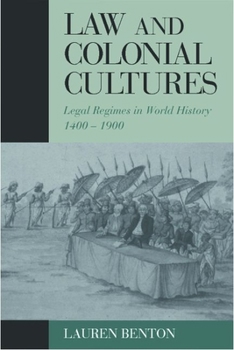Law and Colonial Cultures: Legal Regimes in World History, 1400-1900
(Part of the Studies in Comparative World History Series)
Select Format
Select Condition 
Book Overview
Advances an interesting perspective in world history, arguing that institutions and culture - and not just the global economy - serve as important elements of international order. Focusing on colonial legal politics and the interrelation of local and indigenous cultural contests and institutional change, the book uses case studies to trace a shift in plural legal orders - from the multicentric law of early empires to the state-centered law of the...
Format:Paperback
Language:English
ISBN:052100926X
ISBN13:9780521009263
Release Date:December 2001
Publisher:Cambridge University Press
Length:300 Pages
Weight:0.95 lbs.
Dimensions:0.7" x 6.1" x 8.9"
Customer Reviews
1 rating
An Important Contribution to Global History
Published by Thriftbooks.com User , 15 years ago
As a creative work of synthetic history, the author charts the co-evolution of global legal institutions and their gradual convergence towards greater global uniformity, and later firmly situated in the modern nation-state. The author argues that, over the course of the European colonial era, a global legal framework emerged out of the conflicts between different cultures, as empires expanded and people became more mobile. Using a comparative approach to track this process globally, she explains that it was through such cross-cultural conflicts that similar "routines" and structural patterns emerged in legal regimes around the world. Benton wants to resurrect culture as an element of global structures, emphasizing the importance of cultural identities. Traditionally, such discussions of "world systems" have tended to downplay, or even ignore entirely, human agency in history. She claims, rightfully, that by adding `cultural identity' into the debates about global structures, human agency then becomes central to the discussion. This is one of the book's main strengths and provides a solid model for future studies. Benton states that within the competing legal systems, historical actors were struggling for the ability to draw jurisdictions that best represented themselves and their interests, and resisted being defined (and therefore controlled) by foreign authorities. Benton illustrates that this point was well understood by the litigants in such legal disputes, creating space in her framework for human agency. As Benton demonstrates, these early European empires had legal boundaries that were not defined spatially. Instead, boundaries were drawn in the legal structures, through the creation of cultural distinctions, socially constructed. Benton claims that her approach challenges Euro-centric views of world history, yet most of her focus is on world history...as it relates to European imperialism. Implicitly, European actions are still portrayed as the main historical generators of global connections. Positing that her general approach allows us to see global connections which antedate the modern inter-state system, her book perhaps would have been stronger if it had incorporated more examples of cross-cultural interactions that did not involve Europeans. (good luck with that, methodologically...in all sincerity) Although she clearly states that her objective is to challenge the supposition that all global "progress" emanated from Europe and the exceptionality of European institutions, Europe still remained central to her "de-centered" global history. To be fair, her work will serve as a piece of the foundation of future global studies, which will owe her a debt of gratitude for laying the ground-work for them. The book is surprisingly comprehensible, given the breadth and complexity of the subject. Benton deftly weaves together an extremely broad, global structural evolution with individual legal c






